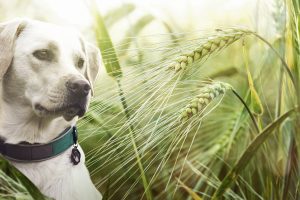Easter eggs (Chocolate!): 
Chocolate contains a stimulant called theobromine (similar to caffeine) that is poisonous to dogs. The darker the colour of the chocolate the more poisonous it is. Do not wait until symptoms develop as early treatment will help you dog recover quicker, please contact us immediately if you think you dog has eaten chocolate, we are likely to induce vomiting. Other treatment may be required depending on clinical signs, time since ingestion and the quantities eaten. Symptoms of toxicity include seizures, diarrhoea, vomiting, extreme thirst, high-strung behaviour, pacing and shaking.
Please do not give chocolate to your dogs or cats at all.
Hot cross buns & fruit cakes: 
Grapes, raisins, currants and sultanas can cause kidney failure to dogs. There is no ‘safe’ dose which means a small amount can be fatal. Please contact us immediately if you think you dog has eaten any, we are likely to induce vomiting. Further treatment may be required. Symptoms can include loss of appetite, lethargy, vomiting or diarrhoea, abdominal pain, dehydration/ increased thirst.
Spring flowers:
Daffodils and azaleas are examples of poisonous plants for dogs. Daffodils, particularly the bulbs and flower heads can cause vomiting, diarrhoea and lethargy. If severe enough, it can cause dehydration, tremors and convulsions. All parts of the bluebell are poisonous to dogs. Dogs are likely to dig up bulbs planted in organic fertilizers and ingest them causing symptoms like vomiting, diarrhoea, abdominal discomfort and irregular heart rate. Other spring flowers such as tulips and crocuses are considered less toxic but please contact us immediately if you think your dog has eaten any of these flowers.
Lilies are highly toxic to cats and can cause severe kidney failure. Signs include lethargy, vomiting, diarrhoea. Contact us immediately if you think your cat had access to any lilies.
Garden Dangers:
Slug and snail pellets contain a toxic compound called metaldehyde which are poisonous for dogs. They are formulated as chewable pellets that are flavoured with  molasses, apple and bran to attract snails, but dogs tend to find them tasty too! Snail bait is also available in liquid and powder formulations which can be licked off their paws when they groom themselves. Even small amounts of this can cause incoordination, muscle spasms, twitching, tremors seizure or even death if left untreated. These symptoms can be seen within an hour so make sure you contact us immediately if you think your dog has ingested these as urgent veterinary treatments will be needed.
molasses, apple and bran to attract snails, but dogs tend to find them tasty too! Snail bait is also available in liquid and powder formulations which can be licked off their paws when they groom themselves. Even small amounts of this can cause incoordination, muscle spasms, twitching, tremors seizure or even death if left untreated. These symptoms can be seen within an hour so make sure you contact us immediately if you think your dog has ingested these as urgent veterinary treatments will be needed.
Fertilisers contain high levels of mineral which can cause toxic imbalances. Some can contain herbicides, pesticides, fungicides which are all potential poisons. If you feel your lawn needs treating, keep your dog safely inside. Depending on length of time of contact, symptoms can include vomiting, diarrhoea, breathing difficulties and gastrointestinal tract ulceration and burns on the skin.
Allergies:
Dogs can develop allergies just like people, especially around springtime. Allergies usually appear as itchy skin, ear problems, hair loss or inflamed skin, runny eyes or respiratory signs. Their behaviour can also change due to the irritation. Do not give your own antihistamines to your dog. These may be toxic and when ingested, signs of vomiting, lethargy, incoordination, wobbliness, tremors and hyperexcitable can occur within 4-7 hours. If large amounts are eaten then convulsions, respiratory depression and coma may occur so contact us immediately if your dog has ingested any antihistamines.

Grass seeds:
Grass seeds can easily brush off onto your dog on a walk. They have a very sharp end that can easily be trapped into your dog’s fur and burrow down to the coat and pierce the skin. Unfortunately, sometimes they find their way under your dog’s skin and travel to other areas of the body! Make sure you check your dog in particular the feet and ears after walking them in areas of long grass. Grass seeds in the paws may cause a painful swelling, limping and dogs tend to lick at it a lot. They may start shaking their heads and pawing at their ears after a walk if any seeds has gone down the ear. Sudden sneezing can also indicate a grass seed has gone up the nose. If you notice any grass seeds on your dog, try removing them but if it has started to burrow into the skin or you think your dog have a seed in their ears or eyes, contact us immediately as they will need to be removed.

Blog written by Jasmine Tsang, Trainee Veterinary Nurse
